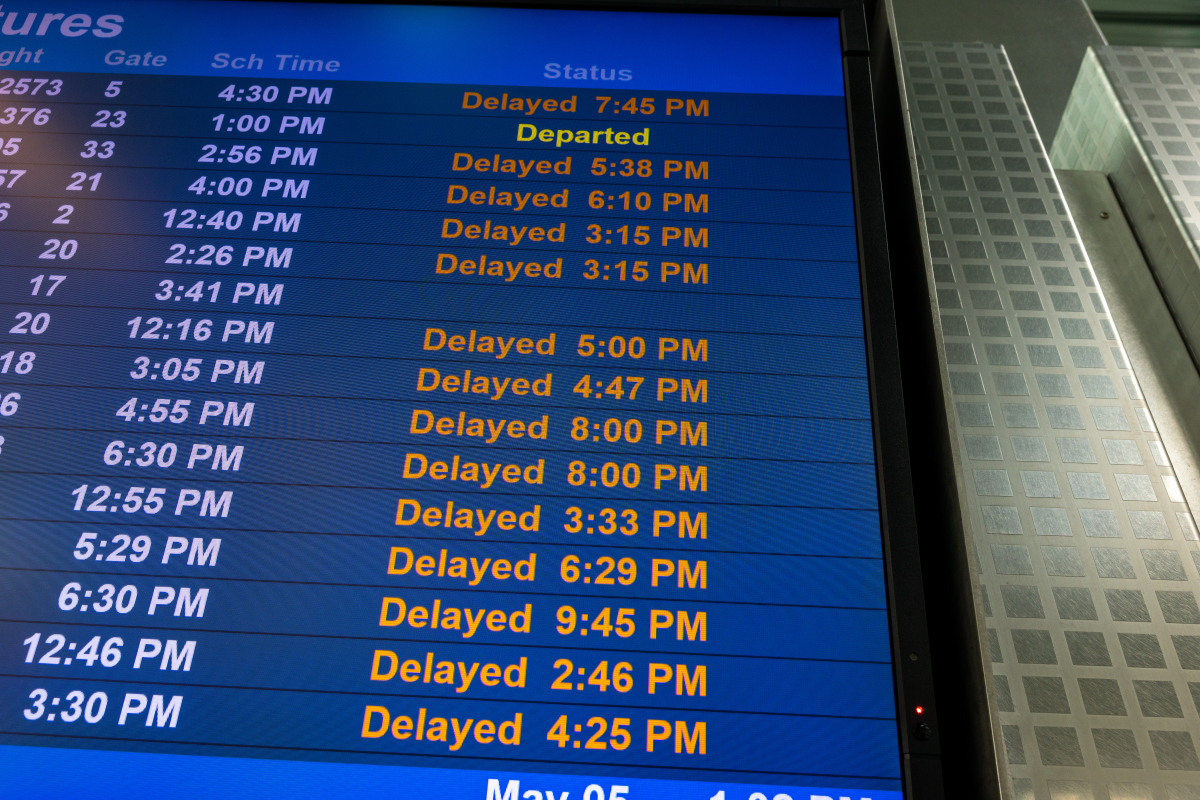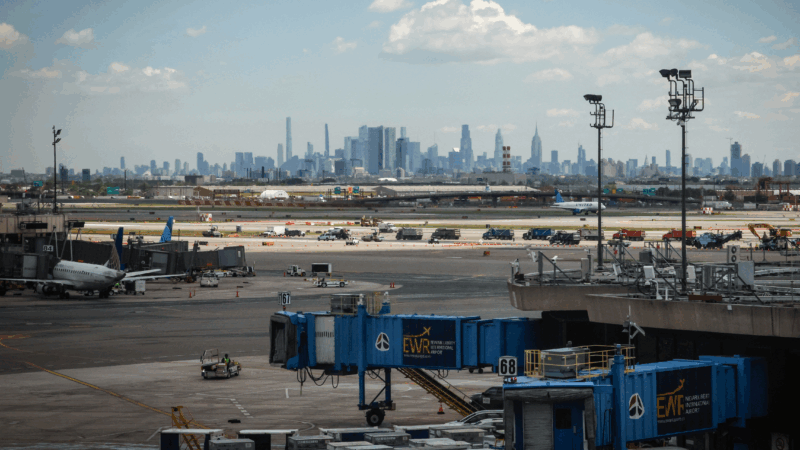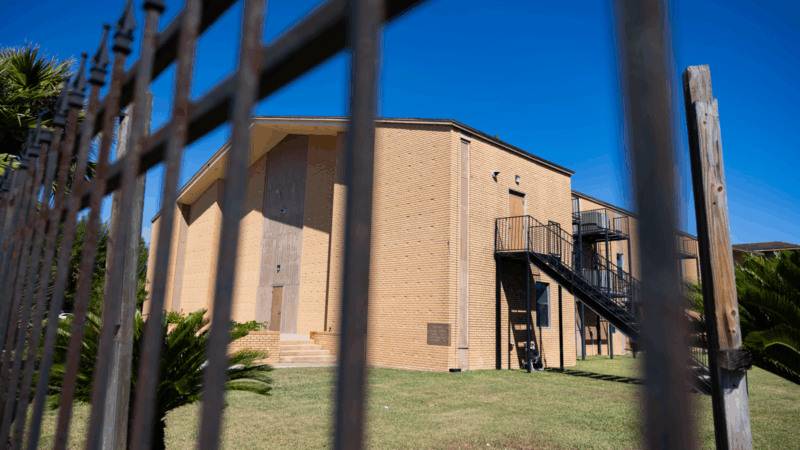A Newark air traffic controller on how it felt when systems went dark
There had been warning signs before radar and communications systems went dark at the facility that manages the airspace around Newark Liberty International Airport, according to an air traffic controller who was on duty during one of those failures.
Still, their first reaction was shock.
“It was like disbelief. And then it was just like fury, honestly, like how could they have us working this, you know?,” said the controller, who works in Philadelphia TRACON Area C, which manages the airspace around Newark. They asked NPR not to use their name because they’re not authorized to speak publicly and are worried about retaliation from their employer, the Federal Aviation Administration.
“We had had other outages prior to that point that demonstrated to us that our equipment was unreliable,” the controller said in an interview this week. Those earlier incidents were alarming enough, the controller says, that controllers handling Newark asked the FAA to reduce the number of planes in the airspace.
“We would ask them for less airplanes, and they would tell us no,” they said.
Now regulators are taking those concerns more seriously. This week the FAA capped the number of flights in and out of Newark at 56 per hour, a cut of about 15%.
The new limits in Newark come after a harrowing month for travelers at one of the nation’s busiest airports — and for the air traffic controllers who work the airspace around it. Radar and communication systems stopped working on at least three occasions, once for as long as 90 seconds, since April 28.
The incidents have raised big questions about how the air traffic control mess in Newark got as bad as it did, and what it will take to fix an aging air traffic control system. And they prompted one air traffic controller to share their perspective in an interview with NPR this week.
“We’re overstretched, we’re understaffed, we’re all stressed out. Our equipment doesn’t work,” the controller said. “It’s just not sustainable.”

Transportation Secretary Sean Duffy insists that limiting that pace of arrivals and departures in Newark will help.
“I believe the system is safe. There are multiple redundancies throughout the system that keep people safe,” Duffy said during a Senate committee hearing last week. “The key is not efficiency, the key is safety.”
In a sense, Newark is suffering from the same problems as the entire air traffic control system in the U.S.: decades of underinvestment in aging communications systems, and a staffing shortage of more than 3,000 air traffic controllers nationwide.
But according to this controller, the recent problems are also unique to Newark — and many of them stem from the way the FAA moved the air traffic controllers who work the Newark airspace from Long Island, N.Y., to Philadelphia last year.
“We have issues FAA-wide. Those things are true. However this particular situation was a self-inflicted FAA decision to move us out of New York. We did not have these issues when we were in New York,” they said. “So you’re trying to make it seem like, well, the FAA is in shambles and that’s why Newark is this problem. No, Newark is this problem because you moved us out of New York without a real plan.”
The FAA did not respond directly to the controller’s allegations. But the agency says moving control of the Newark airspace to Philadelphia was necessary to keep up with demand in some of the nation’s busiest airspace.
“This has been meant to get us healthy on a staffing level,” said Michael Whitaker, former FAA administrator during the Biden administration, said at a press conference in November. “With this move, we’re able to relieve the stress in New York and improve controller staffing levels by recruiting and training controllers in Philadelphia.”
For years, the FAA had been talking about moving control of the Newark airspace out of New York TRACON on Long Island, which handles the airspace around LaGuardia Airport and John F. Kennedy International Airport, the other two major airports in the area.
The FAA was having trouble hiring enough controllers to staff the facility on Long Island, due in part to the low rate of training success there, according to the agency. And the controllers who did work there consistently earned a lot of money through overtime.

Eventually, the FAA decided to move the air traffic controllers who handle Newark to Philadelphia, where the cost of living is lower and it would be easier to recruit. The agency offered bonuses of $100,000 to incentivize controllers to move. Still, some did not like the idea because they had friends and families in New York.
“I get it in a sense why they’re like, well, let’s move it somewhere else,” the controller told NPR. “But I feel like the way that they went about it was really haphazard. It was really reckless, honestly. And it was also a little bit cruel to us as people, as the controllers who they moved.”
There had been 33 certified air traffic controllers working the Newark airspace on Long Island, and two dozen of them made the move last summer to Philadelphia.
From the beginning, there were concerns about how the move would work from a technical standpoint, one of the controllers told NPR.
“It didn’t seem like they had thought out all of the elements of the move and how things would work fully because, you know, we would start asking them questions. Well, what about the equipment? How are you hooking this up? How is this going to work? And we did not get satisfying answers,” they said.
Still, the controller says they tried to keep an open mind. But even they were surprised at how badly it’s gone.
“It’s been worse of a disaster than even the most cynical people in the union predicted,” the controller said. “It’s been a debacle.”
The FAA says it is working on an expedited plan to install new fiber optic lines to replace the copper wires that are still in use in some places, and is also adding new backup systems to help with technical issues in Newark.

Secretary Duffy has announced a plan to “supercharge” the hiring of new air traffic controllers, but the reality is it takes years to train them. And the shortage of controllers is especially acute in Philadelphia, where some controllers have taken trauma leave to recover from the psychological impact of the recent outages.
“We are at our limit. Our families are telling us, you need a break. Like our friends are telling us, you don’t seem OK. We are all at that point,” said the controller we spoke to. “You can tell that people are breaking down. You can see the misery when people show up to work. There have been grown men crying in the parking lot on their breaks because of our work conditions.”
The combination of technical outages and staffing shortages has forced airlines to cancel, delay or redirect hundreds of flights. The problems have disproportionately affected United Airlines, which has a major hub in Newark. And United CEO Scott Kirby put some of the blame on air traffic controllers in a public message to customers.
“Unfortunately, the technology issues were compounded as over 20% of the FAA controllers for EWR walked off the job,” Kirby wrote.
The union that represents air traffic controllers disputes that any walked off the job, saying they are entitled to take time off before going back to work on equipment that failed.
“What we must do now is modernize the system, give the air traffic controllers the equipment they deserve, and not blame them for the issues that they’re seeing,” said Nick Daniels, the president of the National Air Traffic Controllers Association, in an interview.
Other air traffic controllers took issue with Kirby’s comments, too.
“I don’t expect for anyone to weep over us,” said the Newark airspace controller who spoke to NPR. “We get paid more than a lot of people get paid to do this. But we are under immense stress every single day.”

Since these recent outages, aviation experts have insisted it is safe to fly in and out of Newark. But Transportation Secretary Duffy says he’d advised his wife to change her flight from Newark to LaGuardia — not because it was unsafe, Duffy said, but because she needed to get where she was going on time.
The Newark controller told NPR they would not use the airport, either.
“My best friend asked me the other day, like, ‘I got a Newark flight, is it going to be fine?,'” they said. “I was like, no, don’t fly out of Newark. Like, at the very least you’re going to be delayed. But no, like, I’ve had to book flights and Newark is the cheapest and most convenient option, nine times out of ten. And I’m not going to do it.”
Transcript:
AILSA CHANG, HOST:
Federal regulators are limiting the number of flights in and out of Newark Liberty International Airport. The move comes after a harrowing month for travelers at one of the country’s busiest airports and also for the air traffic controllers who work the airspace around it.
(SOUNDBITE OF ARCHIVED RECORDING)
UNIDENTIFIED PERSON #1: We lost our radar, and it’s not working correctly. Radar service remains…
CHANG: Communications and radar systems went dark several times at the air traffic control facility in Philadelphia, where controllers manage the airspace around Newark, as you can hear in these archived audio recordings from the website liveatc.net.
(SOUNDBITE OF MONTAGE)
UNIDENTIFIED PERSON #1: We don’t have a radar, so I don’t know where you are.
UNIDENTIFIED PERSON #2: FedEx 1989, I’m going to hand you off here. Our scopes just went black again.
UNIDENTIFIED PERSON #3: Three of our radar screens went black, and there’s no frequencies.
CHANG: Hundreds of flights in and out of Newark have been canceled or delayed, and now the Federal Aviation Administration is slowing the pace of arrivals and departures. Transportation secretary Sean Duffy insists that that will help.
(SOUNDBITE OF ARCHIVED RECORDING)
SEAN DUFFY: I believe the system is safe. There are multiple redundancies throughout the system that keep people safe. The key is not efficiency. The key is safety.
CHANG: Still, these incidents have raised huge questions about how the mess in Newark got as bad as it did and what it will take to fix an aging air traffic control system. Today, we’re going to hear a perspective from inside that system from an air traffic controller who was working the airspace around Newark during one of those outages. NPR’s Joel Rose covers transportation and joins us now. So, Joel, who was this air traffic controller that you spoke with, and what can you tell us about them?
JOEL ROSE, BYLINE: What I can say, first of all, is that they work in the Philadelphia TRACON – that’s short for the Terminal Radar Approach Control. These are facilities that handle traffic in highly congested airspace, in this case, around Newark. This controller asked us not to use their name because they are not authorized to speak publicly by their bosses at the FAA, and they’re afraid of retaliation for speaking out. They also asked us not to use their voice for the same reason. So what you’re going to hear in this story are their words, but they will be read by one of our producers.
CHANG: Got it. OK. And as we just said, this person was on duty during one of these outages. What was that like?
ROSE: They said it was incredibly frustrating to have the tools that they rely on to do the job simply fail, losing contact with fully loaded jets traveling hundreds of miles an hour in some of the nation’s busiest airspace. Again, this is the voice of an NPR producer reading the words of the air traffic controller.
UNIDENTIFIED PERSON #4: (Reading) It was, like, disbelief. And then it was just, like, fury, honestly. Like, how could they have us working this, you know? Frustration, anger, like just being furious at the FAA because we had other outages prior to that point that demonstrated to us that our equipment was unreliable.
ROSE: This controller says the FAA is paying a lot of attention to their concerns now, but that was not always the case before. The controller says they had asked the FAA to slow the number of planes using this airspace but were told no.
CHANG: Wait, go back a little bit. How did things in Newark airspace get so bad?
ROSE: I know, this is the big question that a lot of people have. In a sense, Newark is suffering from the same problems as the entire air traffic control system in the U.S. There’s underinvestment in technology, in systems that are in many cases decades old. And there’s a shortage of staffing for air traffic controllers. The system nationwide is thousands of controllers short. All of that is true. But according to this controller, the things that happened in Newark are also very specific to Newark, and in particular, the way the FAA moved the air traffic controllers who work the Newark airspace from Long Island to New York, to Philadelphia last year.
UNIDENTIFIED PERSON #4: (Reading) So this particular situation was a self-inflicted FAA decision to move us out of New York. We did not have these issues when we were in New York. And so you’re trying to make it seem like, well, the FAA is in shambles, and that’s why Newark is this problem. No, Newark is the problem because you moved us out of New York without a real plan.
ROSE: Let me back up here for a moment. For years, the FAA had been talking about moving control of the Newark airspace out of Long Island, which handles the other two big airports in the New York area, LaGuardia and JFK. And for a long time, the FAA had trouble hiring enough controllers to staff the facility on Long Island. The training success rate there was also low, and those who did work there made a lot of money in overtime. So the FAA decided the long-term solution here was to move the controllers who handle Newark to Philadelphia, where the cost of living is lower and it would be easier to recruit. Here’s Michael Whitaker, the FAA administrator during the Biden administration, explaining the rationale for this back in November.
(SOUNDBITE OF ARCHIVED RECORDING)
MICHAEL WHITAKER: With this move, we’re able to relieve the stress in New York and improve controller staffing levels by recruiting and training controllers in Philadelphia. This has been meant to get us healthy on a staffing level.
ROSE: As part of this move, some of the controllers from Long Island were forced to relocate. They all get a bonus of $100,000. But many still do not like this because they have families, kids in schools. The controller we spoke to was not happy about the move.
UNIDENTIFIED PERSON #4: (Reading) I get it in a sense, like why. They were like, well, let’s move it somewhere else. But I feel like the way they went about it was really haphazard. It was really reckless, honestly, and it was a little bit cruel to us as people, as the controllers, who they moved.
ROSE: There had been 33 certified air traffic controllers working the Newark airspace from Long Island. Two dozen of them made the move last summer to Philadelphia. And according to the controller we spoke to, some of them had big concerns even then about how the move would work from a technical standpoint. Still, the controller says, they tried to keep an open mind, but even they were surprised at how badly it has gone.
UNIDENTIFIED PERSON #4: (Reading) It’s been worse of a disaster than even, like, the most cynical people in the union predicted. It’s been a debacle.
ROSE: The FAA did not respond directly to these allegations. But the agency says it is working on an expedited plan to install new fiber-optic lines to replace the copper wires that are still in use in some places and adding new backup systems to help with the technical issues in Newark. And Sean Duffy, the Transportation secretary, says the agency is, quote, “supercharging” the hiring of new air traffic controllers. But the reality is that it takes years to train them. And there is a nationwide staffing shortage right now that is especially acute in Philadelphia, where some of these controllers have taken trauma leave to recover from the psychological impact of the recent outages, including the controller we spoke to.
UNIDENTIFIED PERSON #4: (Reading) We are at our limit. Our families are telling us, you need a break. Like, our friends are telling us, you don’t seem OK. We’re all at that point. Like, you can tell people are breaking down. You can see the misery when people show up to work. There have been grown men crying in the parking lot on their breaks because of our work conditions.
CHANG: God, it just seems unsustainable. I guess the bottom line is, is Newark Airport safe?
ROSE: A lot of people say yes. The FAA just announced that they are temporarily cutting the number of flights in Newark to 56 per hour. That’s a number that reflects what the air traffic control system can actually handle. But I put this question to the controller who works the airspace, and here’s what they told me.
UNIDENTIFIED PERSON #4: (Reading) I had my best friend ask me the other day, like, I got a Newark flight – is it going to be fine? I was like, no, don’t fly out of Newark. Like, at the very least, you’re going to be delayed, but no. Like, I’ve had to book flights. And Newark is the cheapest option, the most convenient option 9 times out of 10, and I’m not going to do it.
ROSE: Even the Transportation secretary, Sean Duffy, admitted that he had his wife change her flight from Newark to LaGuardia Airport in New York City…
CHANG: Wow.
ROSE: …Not because it was unsafe, he said, but just because she needed to get where she was going. And I think a lot of people will be wrestling with those kinds of choices.
CHANG: That is NPR transportation correspondent Joel Rose. Thank you so much, Joel.
ROSE: You’re welcome.
Voting nears to a close in Texas primary that may be crucial to control of the Senate
The GOP and Democratic primaries mark a potential litmus test for what direction base voters want their parties to go ahead of midterm elections this fall that will determine power in Congress.
Pregnant migrant girls are being sent to a Texas shelter flagged as medically risky
Government officials and advocates for the children worry the goal is to concentrate them in Texas, where abortion is banned.
The 2026 World Cup faces big challenges with only 100 days to go
Will Iran compete? Will violence in Mexico flare up? And what about funding for host cities in the U.S.? With only 100 days left before it beings, the 2026 World Cup in North America is facing a lot of uncertainty.
A glimpse of Iran, through the eyes of its artists and journalists
Understanding one of the world's oldest civilizations can't be achieved through a single film or book. But recent works of literature, journalism, music and film by Iranians are a powerful starting point.
Mitski comes undone
She may be indie rock's queen of precisely rendered emotion, but on Mitski's latest album, Nothing's About to Happen to Me, warped perspectives, questionable motives and possible hauntings abound.
This quiet epic is the top-grossing Japanese live action film of all time
The Oscar-nominated Kokuho tells a compelling story about friendship, the weight of history and the torturous road to becoming a star in Japan's Kabuki theater.







